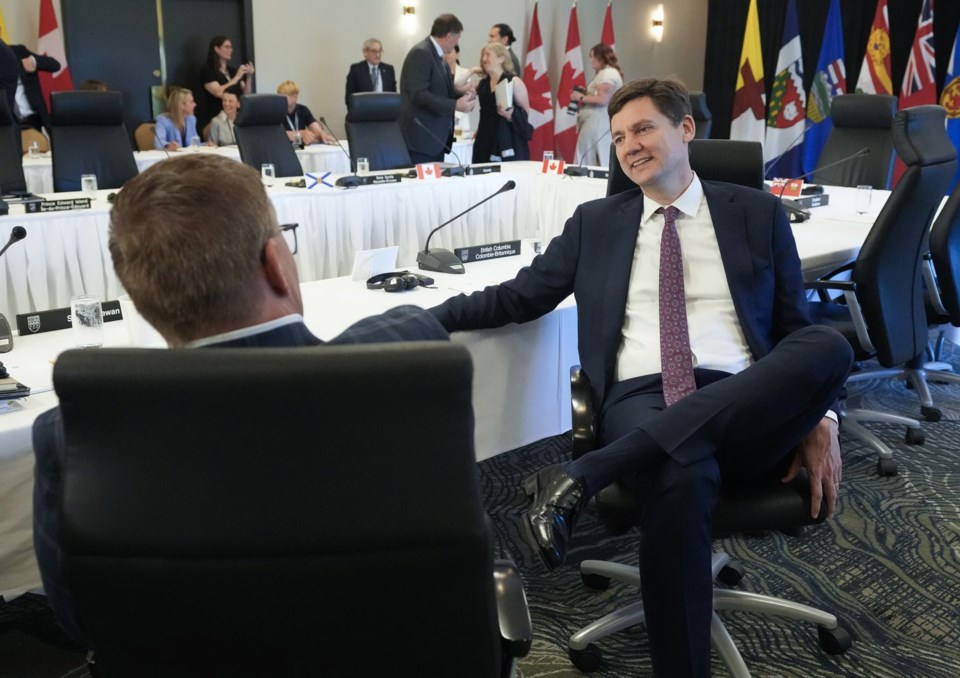Wedad Bishara says she's seen more clients interested in exploring Canada this year than in her three previous decades as a travel agent.
Based in Vancouver, B.C., Bishara said U.S.-bound travellers are a relatively small part of her business, but she has noticed the change growing since U.S. President Donald Trump announced plans for steep tariffs on Canadian goods and said Canada would be "better off" as the 51st U.S. state.
It's part of a shift that has seen Canadian travel to the United States plunge, prompting the U.S. Ambassador to Canada, Pete Hoekstra, to say Canadians staying away is among the reasons Trump thinks they are "nasty" to deal with.
Hoekstra, who was speaking at the annual Pacific Northwest Economic Region Foundation summit in Bellevue, Wash., on Monday, also pointed to provincial bans on U.S. alcohol sales at government stores.
But British Columbia Premier David Eby said Tuesday that most Canadians would be "proud" to be considered mean and "nasty" for standing up for their sovereignty and economy in the face of threats from Trump's administration.
Speaking at a premiers' gathering in Huntsville, Ont., Eby said B.C. has worked in close partnership with states in the U.S. Pacific Northwest for many years, spurring economic growth and other benefits on both sides of the border.
He said Americans are friends, colleagues and family members, and the cross-border co-operation is an example of why Canadians "have no interest in being mean and nasty" and instead want to work with Americans, Eby said.
"We need the president to understand the benefits that flow from working in co-operation," he added.
On Monday, Eby's office had provided The Canadian Press a recording of Hoekstra's remarks.
Hoekstra said the alcohol bans and the drop in Canadian visits south of the border "don't send positive signals" about Canada treating the United States well.
It was "Canadians' business" if they want to stay home, he said.
"I don't like it, but if that's what they want to do, it's fine. They want to ban American alcohol. That's fine," the ambassador told the conference crowd.
"There are reasons why the president and some of his team referred to Canada as being mean and nasty to deal with, OK, because of some of those steps."
A statement from Eby on Monday said the U.S. ambassador's remarks showed Canadians' efforts to stand up to Trump are "having an impact."
"Keep buying Canadian. Keep your vacations Canadian," Eby said.
Statistics Canada figures show the number of Canadians returning home by car from south of the border fell more than 33 per cent in June compared with the same month last year, marking the sixth consecutive month of year-over-year declines.
Return trips by air fell just over 22 per cent year-over-year.
The number of Americans arriving in Canada by air decreased 0.7 per cent in June compared with the same time last year, while arrivals by car dropped 10.4 per cent.
Bishara said U.S.-bound travellers make up just five to 10 per cent of her business with Marlin Travel in downtown Vancouver, but she has noticed a shift this year.
Some clients have indicated they would rather not travel south of the border, while others have continued to spend summers at time-share properties in Arizona and California, Bishara said in an interview on Tuesday.
Overall, though, people are interested in travelling to different parts of Canada "more than any other year before" in Bishara's 35-year career, she said.
"So, there are more trips that we design for Newfoundland and New Brunswick and all the East Coast."
Bishara said the Maritimes have a "richness of beauty" and her clients have returned home happy with their experiences.
Nitin Gaba, whose family runs Gaba Travel Ltd., with several offices in Metro Vancouver, said he hasn't noticed as much of an uptick in clients travelling to different parts of Canada — but more people are steering clear of the United States.
Initially, he said people wrote off Trump's tariff plans and remarks that Canada would be better off as the 51st state as "talk" that didn't worry them.
However, since Trump's inauguration in January, Gaba said more clients are fearful of crossing the border.
"They've heard stories of someone going to the border and getting their phone searched or getting detained or being asked questions about Trump," he said.
"There's all these stories going around and I don't know if they're real or not, but people are more afraid about those things."
Clients travelling to India make up about 80 per cent of Gaba's business. Others want to go somewhere warm and sunny, and while some are still travelling south of the border, the United States may not be their first choice, he said.
"Most of those people will try to look at other options first to see if they're feasible and doable, but if those don't work, then sometimes they do end up going," he said.
"Hawaii is still happening, Alaska cruises are still happening, and I would say some Disneyland traffic, but all of it I would say is down quite a bit."
Some clients who would have considered travelling to California, Arizona or Florida are now choosing Mexico instead, Gaba noted.
Gaba said the travel agency also has many local clients who would typically drive to visit family in Seattle or Portland, Ore., and they're taking fewer trips this year.
"Most of them are too scared to cross the border and haven't gone since basically January."
This report by The Canadian Press was first published July 22, 2025.
Brenna Owen, The Canadian Press



